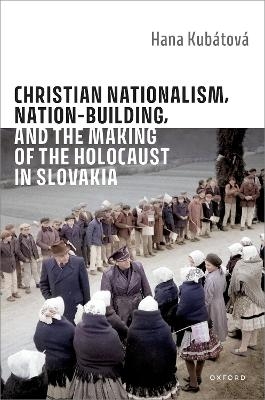
Christian Nationalism, Nation-Building, and the Making of the Holocaust in Slovakia
Seiten
2025
Oxford University Press (Verlag)
978-0-19-894509-3 (ISBN)
Oxford University Press (Verlag)
978-0-19-894509-3 (ISBN)
- Noch nicht erschienen (ca. März 2025)
- Versandkostenfrei innerhalb Deutschlands
- Auch auf Rechnung
- Verfügbarkeit in der Filiale vor Ort prüfen
- Artikel merken
Christian Nationalism, Nation-Building, and the Making of the Holocaust in Slovakia examines how communal murder and betrayal intersected with nation-building during World War II.
Previous scholarship on fascism in Slovakia has focused on either state actors operating from urban centres or the mechanisms of violence on a grassroots level - with the result being that the Holocaust is seen as primarily a top-down and state-centred process.
In contrast, Hana Kubátová reveals here a dynamic and unexplored centre-periphery relationship, and how violence against the Jewish population unfolded in both cities and the countryside, and on both national and local levels. As an integral component of broader nation-building efforts, the authority of the fascist regime and the newly-founded Slovak state hinged not only on appeasing Hitler but also on civilian populations of the nation's heterogenous eastern borderlands, especially local elites, such as priest and teachers, as well as the rural masses. The book explores how this relationship was forged, how it was maintained, and how, ultimately, Christian nationalism operated as a political strategy that brought differently positioned actors together - to broker deals over resources and power accrued through the co-enactment of genocide by a broad coalition of perpetrators on the ground. In so doing, this little-known chapter of Holocaust history offers a new way to understand the dynamics and escalations of mass violence, and how collaborations between elite and popular groups can pave the way for ethnic cleansing across different territories and, even, times.
Previous scholarship on fascism in Slovakia has focused on either state actors operating from urban centres or the mechanisms of violence on a grassroots level - with the result being that the Holocaust is seen as primarily a top-down and state-centred process.
In contrast, Hana Kubátová reveals here a dynamic and unexplored centre-periphery relationship, and how violence against the Jewish population unfolded in both cities and the countryside, and on both national and local levels. As an integral component of broader nation-building efforts, the authority of the fascist regime and the newly-founded Slovak state hinged not only on appeasing Hitler but also on civilian populations of the nation's heterogenous eastern borderlands, especially local elites, such as priest and teachers, as well as the rural masses. The book explores how this relationship was forged, how it was maintained, and how, ultimately, Christian nationalism operated as a political strategy that brought differently positioned actors together - to broker deals over resources and power accrued through the co-enactment of genocide by a broad coalition of perpetrators on the ground. In so doing, this little-known chapter of Holocaust history offers a new way to understand the dynamics and escalations of mass violence, and how collaborations between elite and popular groups can pave the way for ethnic cleansing across different territories and, even, times.
Hana Kubátová studied political science, international relations, nationalism studies, and modern history at Charles University and Central European University. She held research positions at Tel Aviv University, Slovak Academy of Sciences, Heinrich Heine University, the United States Holocaust Memorial Museum, and the Institute for Advanced Study at CEU. She has received numerous fellowships, including the Marie Curie Fellowship for Early Research Training, the Charles H. Revson Foundation Fellowship, the Felix Posen Fellowship, and the Junior Core Fellowship.
| Erscheint lt. Verlag | 13.3.2025 |
|---|---|
| Verlagsort | Oxford |
| Sprache | englisch |
| Maße | 156 x 234 mm |
| Themenwelt | Geschichte ► Allgemeine Geschichte ► Neuzeit (bis 1918) |
| Geschichte ► Allgemeine Geschichte ► 1918 bis 1945 | |
| Geisteswissenschaften ► Geschichte ► Regional- / Ländergeschichte | |
| ISBN-10 | 0-19-894509-4 / 0198945094 |
| ISBN-13 | 978-0-19-894509-3 / 9780198945093 |
| Zustand | Neuware |
| Informationen gemäß Produktsicherheitsverordnung (GPSR) | |
| Haben Sie eine Frage zum Produkt? |
Mehr entdecken
aus dem Bereich
aus dem Bereich
Giordano Bruno - ein ketzerisches Leben
Buch | Hardcover (2024)
C.H.Beck (Verlag)
29,90 €
das dramatische 16. Jahrhundert
Buch | Hardcover (2024)
Rowohlt Berlin (Verlag)
34,00 €


